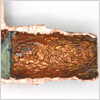You are here: Homepage » Piping & Fitting » Pipe Corrosion
Pipe Corrosion
 Corrosion is the gradual wearing away of a material by its environment. Dissimilar metal contact, oxygen, water, and debris can all generate pipeline corrosion. Left untreated, rusty pipes will lead to a variety of expensive plumbing problems such as burst pipes, slab leaks, and clogged drains. With the yearly cost of corrosion approximated at over $276 billion – no wonder Americans spend millions of dollars on pipe corrosion repair in their homes and businesses.
Corrosion is the gradual wearing away of a material by its environment. Dissimilar metal contact, oxygen, water, and debris can all generate pipeline corrosion. Left untreated, rusty pipes will lead to a variety of expensive plumbing problems such as burst pipes, slab leaks, and clogged drains. With the yearly cost of corrosion approximated at over $276 billion – no wonder Americans spend millions of dollars on pipe corrosion repair in their homes and businesses.
By understanding the basic facts of residential plumbing pipeline corrosion, you can control or prevent this destructive force to save money and maintain a hazard free living environment for your family.
Want to prevent destructive pipe corrosion problems? Submit the form on your right and receive multiple plumbing estimates.
Water Pipe Corrosion
Under certain conditions, copper, steel and iron pipes and fittings are vulnerable to corrosion attacks. The joining of different metals like copper and aluminum or copper and steel causes corrosion in piping. Metal pipe corrosion is also called galvanic corrosion and is a result of electrochemical electron exchange from the differential galvanic properties between dissimilar metals. Plumbers control or prevent corrosion in pipes by using anti corrosion pipes or at least the same types of metals for plumbing connections. When corrosion resistant pipes are unavailable and plumbers cannot use the same metal - they will install pipe corrosion protection in the form of a fiber or plastic connector between the joints to prevent different metals from touching. The following variables influence the rate of corrosion in metal piping:
- Chemical composition of water
- Low pH values of water
- Amount of oxygen in water
- Water pressure in pipe
- Galvanic corrosion
- Water temperature
Copper Pipe Corrosion
 Pitting corrosion causes pinhole leaks in copper water pipes. Copper pipe corrosion leads to the formation of small pits on restricted areas of the metal surface – resulting in leaky pipes that can waste as much as 70 gallons of water per day. Copper pipe corrosion forms for unknown reasons, but many plumbers attribute the chemistry of water passing through copper pipes to the development of pits.
Pitting corrosion causes pinhole leaks in copper water pipes. Copper pipe corrosion leads to the formation of small pits on restricted areas of the metal surface – resulting in leaky pipes that can waste as much as 70 gallons of water per day. Copper pipe corrosion forms for unknown reasons, but many plumbers attribute the chemistry of water passing through copper pipes to the development of pits.
Pipe Corrosion Protection
Aside from causing multiple plumbing problems, corroded pipes turn water passing through them highly acidic,non-drinkable, and of a brownish-rusty color. For this reason pipe corrosion repair should be conducted as soon as the symptoms for corrosion are detected by you. Worn or discolored patches along pipelines or lower than 7 pH values of water are common signs for pipe corrosion. Plumbers advise homeowners to conduct periodical inspections of exposed copper piping for bluish-green stains that in many cases indicate pinhole leaks. If spotted, homeowners and tenants need to call their local plumbers for effective treatment. Installing pipe clamps over pinholes will stop water escape and damage control the leaking pipe emergency until professional repair is made.
 Plumbers
Plumbers
 Advertise in Multiple Websites
Advertise in Multiple Websites Pay for what you get
Pay for what you get
 (800) 325-9150
(800) 325-9150